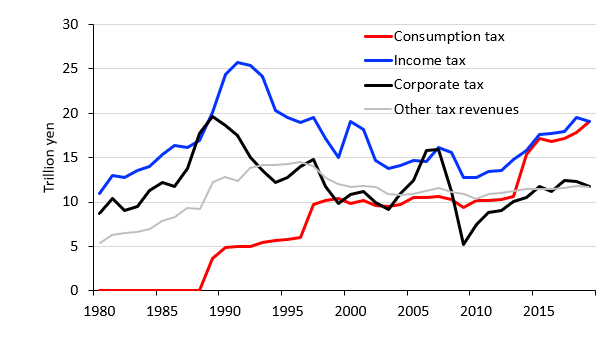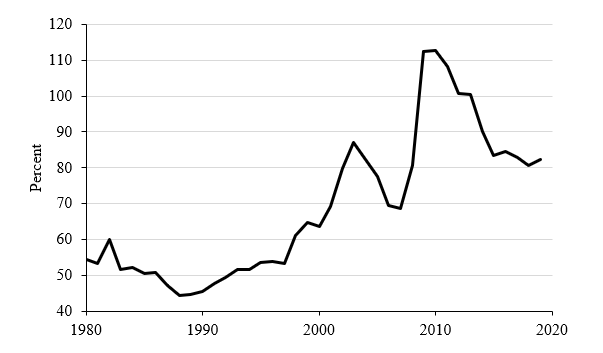The sudden resignation of Japans Prime Minister Shinzo Abe has led to evaluations of his so-called Abenomics. Many have praised Abe’s aggressive monetary policy because the long shopping list of the Bank of Japan (government bonds, corporate bonds, ETFs and real estate investment trusts) has inflated stock and real estate prices (Shirai 2020; Financial Times 2020). Concerns remain on the fiscal side since Abe’s consumption tax hikes from 5 percent to 8 percent in 2014 and to 10 percent in 2019 are widely seen as a failure (The Economist 2020). Indeed, Abe resolved Japan’s deep-seated fiscal problems only superficially.
Figure 1: Tax Revenues of Japan’s Central Government

Source: Ministry of Finance, Japan.
The core of the problem is cheap money issued by the Bank of Japan, which had caused a stock and real estate bubble in the second half of the 1980s. While the bubble had inflated tax revenues, its bursting was followed by an unprecedented economic slump during which the corporate and income tax revenues collapsed from 43 trillion yen (approx. 390 billion dollars) in 1990 to 23 trillion yen (approx. 185 billion dollars) in 2012 (Figure 1), when Abe took office.
Figure 2: Social Security Expenditure and Local Allocation Tax as Share of Total Tax Revenues

Source: Ministry of Finance, Japan. Central Government.
At the same time Japan’s aging population ballooned the government contributions to the public pension and health insurance system, from 12 trillion yen (approx. 110 billion dollars) in 1990 to 36 trillion yen (approx. 327 billion dollars) in 2019. In addition, the so-called local allocation tax grants of around 16 trillion yen per year (approx. 145 billion dollars) to the economically exhausted Japanese periphery continued to constitute a heavy burden for the central government. In the wake of the global financial crisis, both together had increased far beyond the central governments’ tax revenues (Figure 2).
…click on the above link to read the rest of the article…